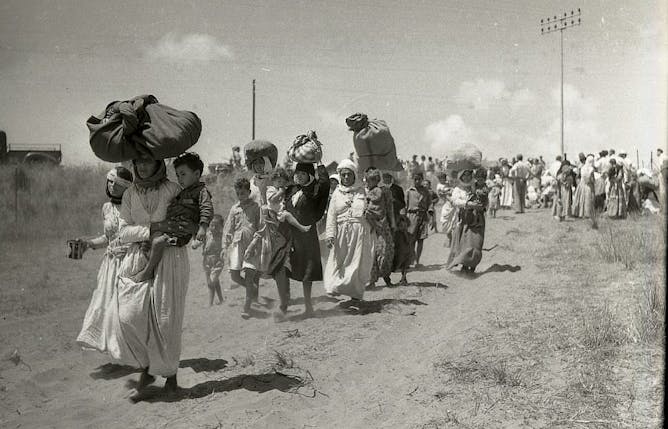|
Recently, the UN passed a resolution to recognize Nakba Day on May 15 to mark the anniversary of the expulsion of Palestinians from their homes in 1948. The resolution helps to acknowledge past traumas, but does it have other implications? Will it impact solutions on the ground? Might it change the way some people view history and therefore how they think about the future?
On this week’s episode of Don’t Call Me Resilient, we meet up with M. Muhannad Ayyash, professor of sociology at Mount Royal University in Calgary, to help unpack some of the meanings behind this resolution.
Ayyash talks about the abundance of possible solutions. He says: “Nobody is going anywhere. So we need to imagine social and political life on this land, beyond the Euro-American, colonial, ideology… We need to rethink fundamental questions about our relationship to the land and our relationship to each other.”
Listen to the episode to hear more.
Also today:
All the best.
|

|
Vinita Srivastava
Host + Producer, Don't Call Me Resilient | Senior Editor, Culture + Society
|
|

It’s been 75 years since Palestinians were first expelled from their homeland. Here, people from Tantura as they were relocated to Jordan, June 1948.
(Benno Rothenberg/Meitar Collection/National Library of Israel/The Pritzker Family National Photography Collection)
Vinita Srivastava, The Conversation; Boké Saisi, The Conversation
The UN’s resolution to recognize Nakba Day on May 15, to mark the expulsion of Palestinians from their homes in 1948, helps to acknowledge past traumas but does the resolution have other implications?
|

The emotional well-being of the workforce and workplace culture are critical to the success of any organization.
(Shutterstock)
Dayna Lee-Baggley, Dalhousie University; Shannan M. Grant, Mount Saint Vincent University
A growing body of evidence shows that the emotional health and well-being of the workforce is of equal or greater importance than physical safety.
|

When regulatory agencies like Health Canada approve a new drug, they require the drug company to continue monitoring the product’s safety.
(Shutterstock)
Joel Lexchin, York University, Canada
Health Canada continues to monitor newly approved drugs to determine if the benefits identified in the pre-market trials hold up to further scrutiny. Canadians need better access to that information.
|

People gathered at West Texas A&M University in Canyon, Tex. on March 21, 2023 to protest the university president’s decision to cancel a drag show on campus.
(Michael Cuviello/Amarillo Globe-News via AP)
Kristopher Wells, MacEwan University
Anti-LGBT sentiments are on the rise around the world, and Canada is not immune to the tide. Now is the time for us to speak out and denounce anti-LGBTQ actions and rhetoric.
|

A special constable with the Kawartha Lakes Police Services stands at a road block in Kawartha Lakes, Ont. in November 2020, following the death of an 18-month-old boy during a police pursuit.
THE CANADIAN PRESS/Doug Ives
Patrick G. Watson, Wilfrid Laurier University; Carmen Nave, Wilfrid Laurier University; T Sidhu, University of Waterloo
A criminal trial is a venue where not only individual police officers accused of crimes are put under public scrutiny, but so too are the training and tactics that officer received.
|
La Conversation Canada
|

Certaines des conceptions culturelles que nous avons du vin, notamment son authenticité, proviennent du caractère commercial de ce produit.
(Shutterstock)
Vincent Fournier, Université du Québec à Montréal (UQAM)
Cela fait 3000 ans que le vin est un produit commercial. Paradoxalement, plusieurs des idées culturelles avec lesquelles nous le percevons aujourd’hui proviennent, justement, de ce caractère marchand.
|
Podcasts
|
-
Daniel Merino, The Conversation; Nehal El-Hadi, The Conversation
Cloud seeding – spraying materials into clouds to increase precipitation – has been around for nearly 80 years. But only recently have scientists been able to measure how effective it really is.
|
|
Arts
|
-
Michael White, University of York
Growing up in Yorkshire gave Hepworth and Moore outsider viewpoints on the art world.
|
|
Politics
|
-
May Darwich, University of Birmingham
There is a risk that Sudan’s conflict could spill over into neighbouring countries.
|
|
Science + Tech
|
-
Ted Heindel, Iowa State University
A mechanical engineer explains why you need to go with the flow. The TSA pronouncement that peanut butter is a liquid is scientifically sound.
|
|
|
|
| |
| |
| |

|
| |
| |
| |
| |
| |
| |
|
|